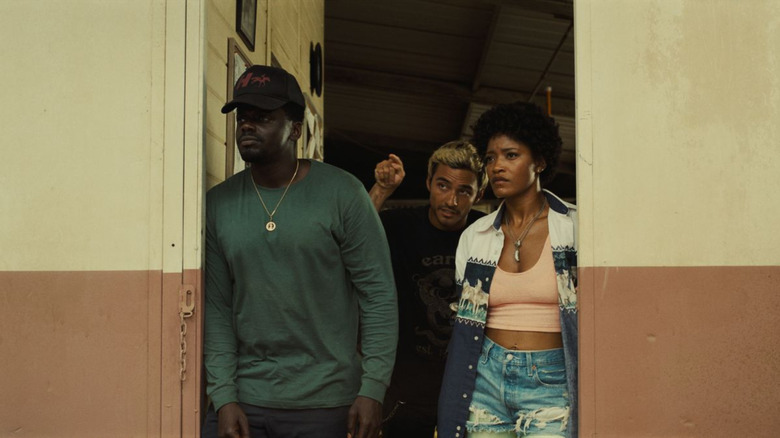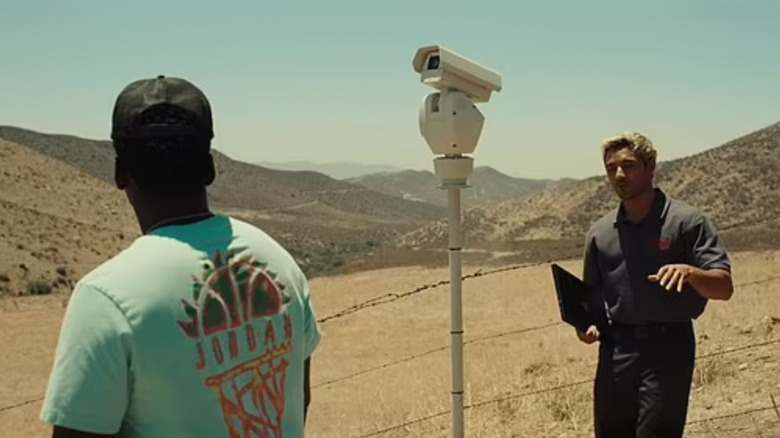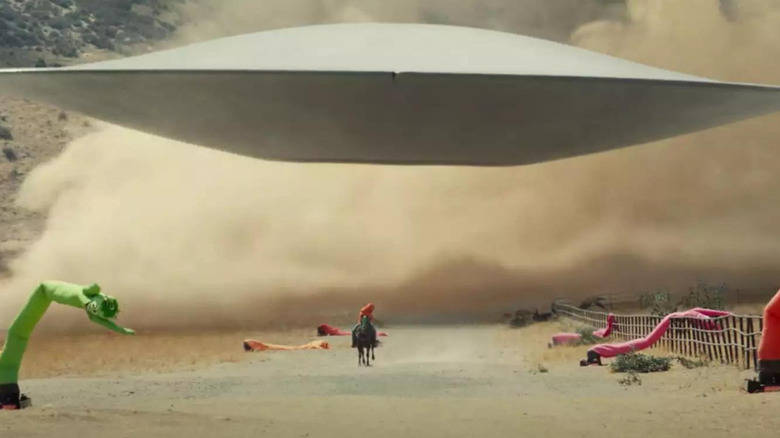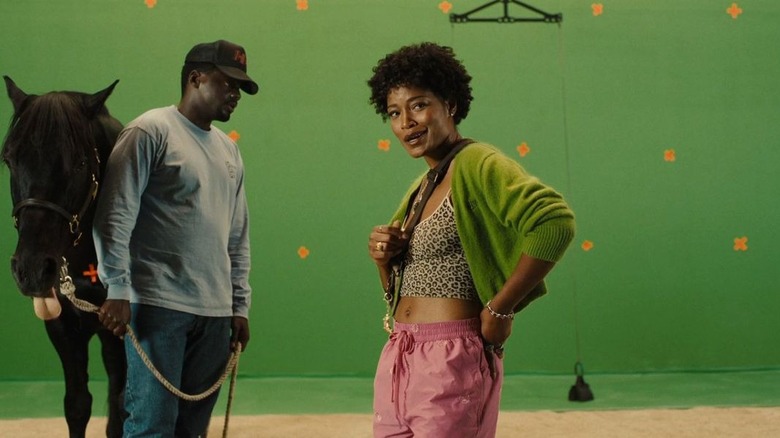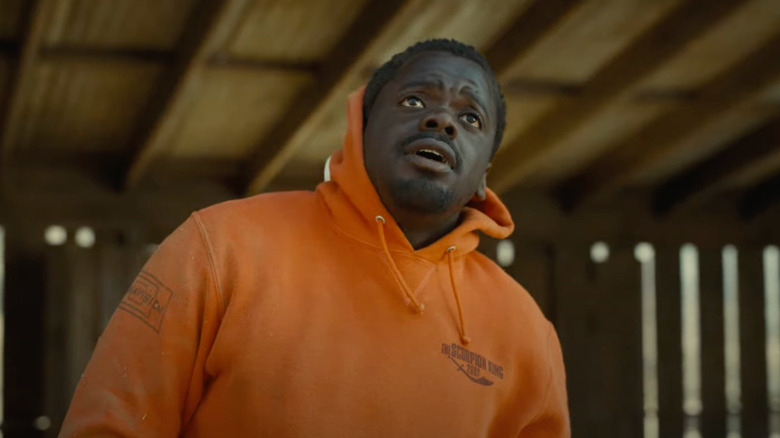Nope Ending Explained: Getting That Oprah Shot, No Matter The Cost
Warning: this article contains major spoilers for "Nope."
After what seemed like a life-long period of waiting, "Nope" has finally landed in theaters. It wasn't that long ago that we actually found out what the film was about, and even then, there was a lot that we couldn't have possibly expected. What started off as a story about siblings OJ (Daniel Kaluuya) and Emerald (Keke Palmer), tech salesman Angel (Brandon Perea), and cinematographer Antlers (Michael Wincott) attempting to record footage of an unidentified flying object quickly became the fight for their lives.
The decision to keep the marketing as vague as possible ultimately succeeded in making us ill-prepared for what audiences are about to experience. Sure, we saw some pretty critical scenes in the trailers and commercials, but actually seeing them come together probably made you realize just how in the dark you really were about the movie.
Case in point: how much of a love and hate letter to Hollywood that "Nope" really is. While the film has a deep appreciation for the art of moviemaking, it understands that these moments of magic often come at the expense of exploitation. By using a terrifying alien creature as a symbol for the volatile consumption of creatives and crew, "Nope" questions if the spectacle of show business is really worth the mistreatment inflicted upon those involved.
Risking it all for the perfect shot
So, how are you going to try and get the fabled Oprah shot? Set up an intricate plan that tracks the murderous alien's presence throughout the Haywood Ranch.
After a brief run-in with a paparazzo and a hell of a lot of running, the crew thinks they were finally able to get clear footage of the damn thing — footage that will be good enough to get them that coveted spot on Oprah's show. Unfortunately, Antlers still thinks he has a shot of getting a better one. The good news is that he was able to actually get a good view of the creature from his portable non-electrical camera. The bad news is that he and the camera get sucked into the creature's disgusting mouth.
That's not the only camera in the group that is no longer working. After it devours Antlers, the creature destroys the campsite that he and Angel were staking out under, subsequently destroying the other makeshift camera the cinematographer brought with him. Angel himself is almost the next casualty, but due to some quick thinking and some handy barbed wire, is able to avoid that fate, instead being thrown back onto the ranch.
Unfortunately, things are looking dire for OJ and Emerald, with the former deciding to use himself as bait so that his sister can drive her way into the nearby Jupiter's Claim. As soon as OJ is far enough away, Emerald kicks the paparazzi's motorcycle, arriving into the deserted theme park in an always-badass "Akira" homage.
Don't forget to give those flashbulbs a wink
Think of Chekov's gun, but with a theme park wishing well attraction. Don't introduce it in the first act if it doesn't come into play in the third.
When Emerald makes it to the park, she makes work of untying its massive cartoon inflatable into the sky. She then finds that the Jangles needed to operate the Winkin' Well photobooth are scattered all over the ground, deciding to use it as a last-ditch effort to get photographic proof of the alien. Now in its full Lovecraftian form, it goes after the floating mascot inflatable as Emerald tries taking photos of it in air. It then attempts to swallow the balloon, but this was an object far too dangerous for it to consume, causing it to explode.
Thankfully, Emerald was able to get that Oprah shot she was hoping for so badly. However, unlike her dreams of fame from the beginning of the film, she could care less about the swarms of reporters arriving back at Jupiter's Claim. Instead, she only cares about the figure she sees of OJ on top of their horse Lucky, giving a happier version of the now-iconic Peele Cry in the process.
We've had skin in the game
One of the biggest repeated criticisms of "Nope" is the idea that it is less thematically rich than Peele's earlier work. That's not necessarily the case, as the themes touched upon are mainly focused on a particular industry rather than our larger society. "Nope" is undeniably about the current state of Hollywood and filmmaking, where movies are built more on how jaw-dropping they look rather than how carefully constructed they are. Sure, it is also a commentary on how the general populace has an obsession with seeing things that are unlike anything else before, but who are the people creating these events? Crew members, the often unsung heroes of entertainment that have endured far too much for the sake of art. They're often the ones who are put in the line of danger or are subjected to low pay in harsh conditions, all because higher-ups in these productions want to increase the spectacle.
This can be demonstrated in the makeup of our central alien-hunting group. OJ and Emerald are animal wranglers, a job that can be very dangerous due to how unpredictable the animals they work with can be. Anders is a cinematographer, a position whose work is often falsely credited to the director, as they are responsible with finding the right shots and angles for certain scenes. Finally, Angel is the techie; think the gaffers, the camera operators, and everything else in between that allows the production to go on as planned, but rarely get the recognition they deserve.
You don't get to hate it unless you love it
OJ is not unlike many of the crew members or aspiring creatives that I and many others have met throughout the industry. While his work is hard and sometimes not even worth it in the long run, he loves the horses that he sells and trains. He couldn't imagine doing anything else but maintain the Haywood family legacy, even considering selling it off so that it could still operate in a more profitable manner. Emerald eventually becomes the same way over the course of the movie, realizing that the fame and fortune that could result from the discovery of aliens will never be a replacement for true passion.
The filmmaking industry is arguably not in a good place, but that doesn't mean it isn't filled with people who aren't passionate about what they do. After all, the talk of potential IATSE strikes last year was made because crew members believed that the industry that they love could and should treat them better. That remains true to this day; the industry does have the potential to be fairer and less abusive to those it employs. Here's to hoping that discussions about making these changes possible will continue to be held, and we won't have to make these operatic and metaphorical films to convey just how necessary they are.
